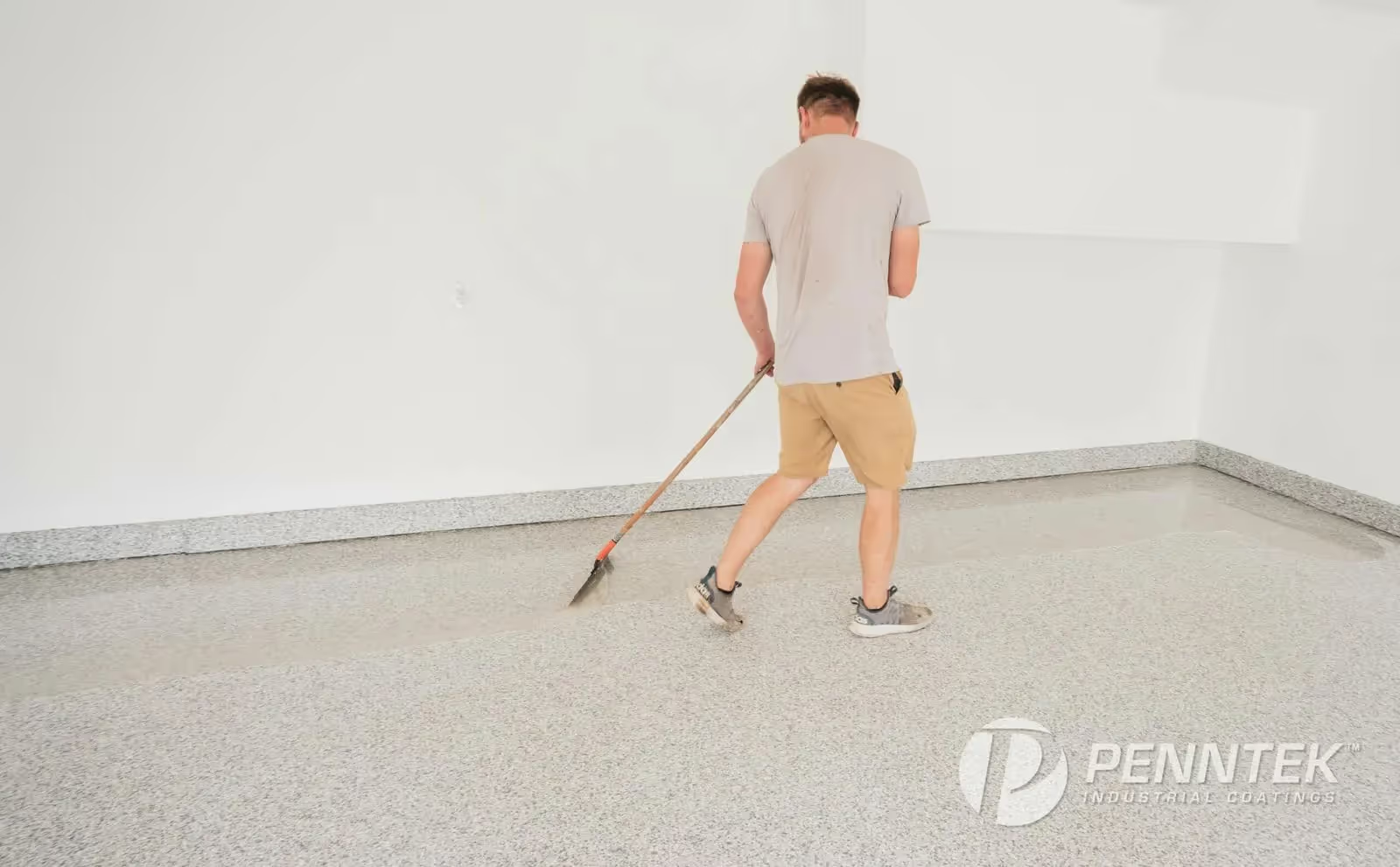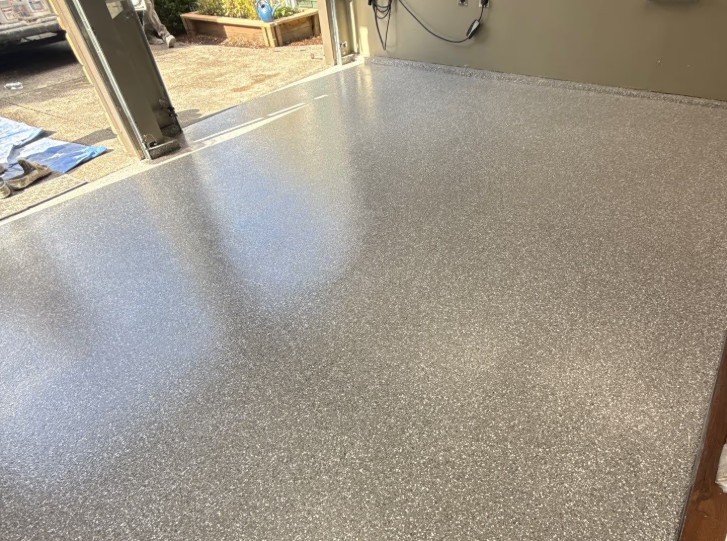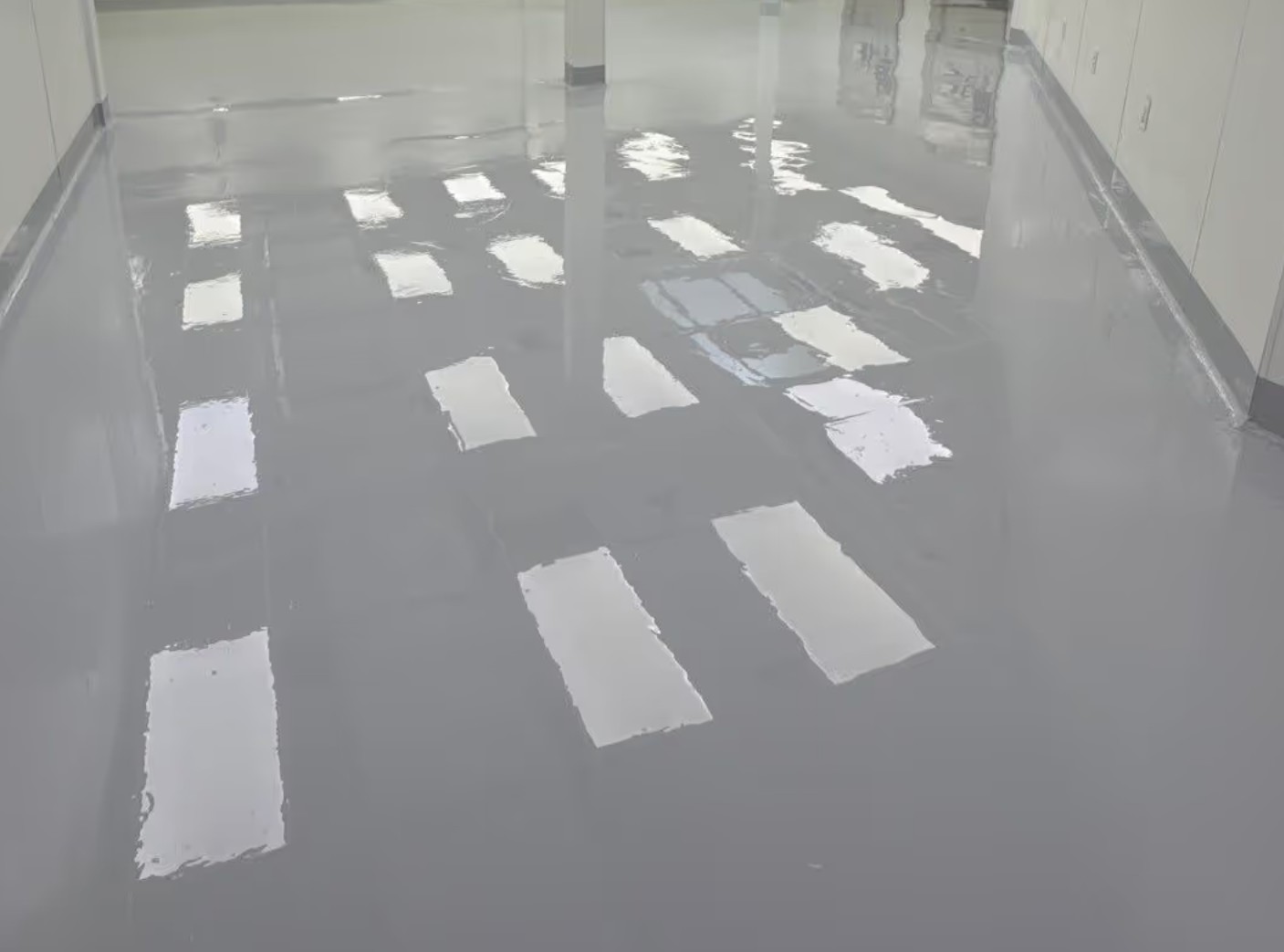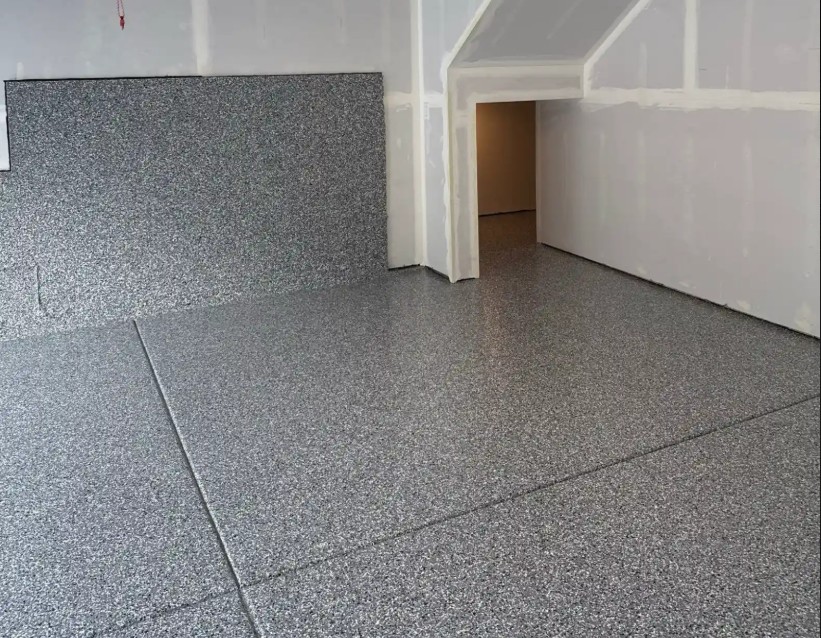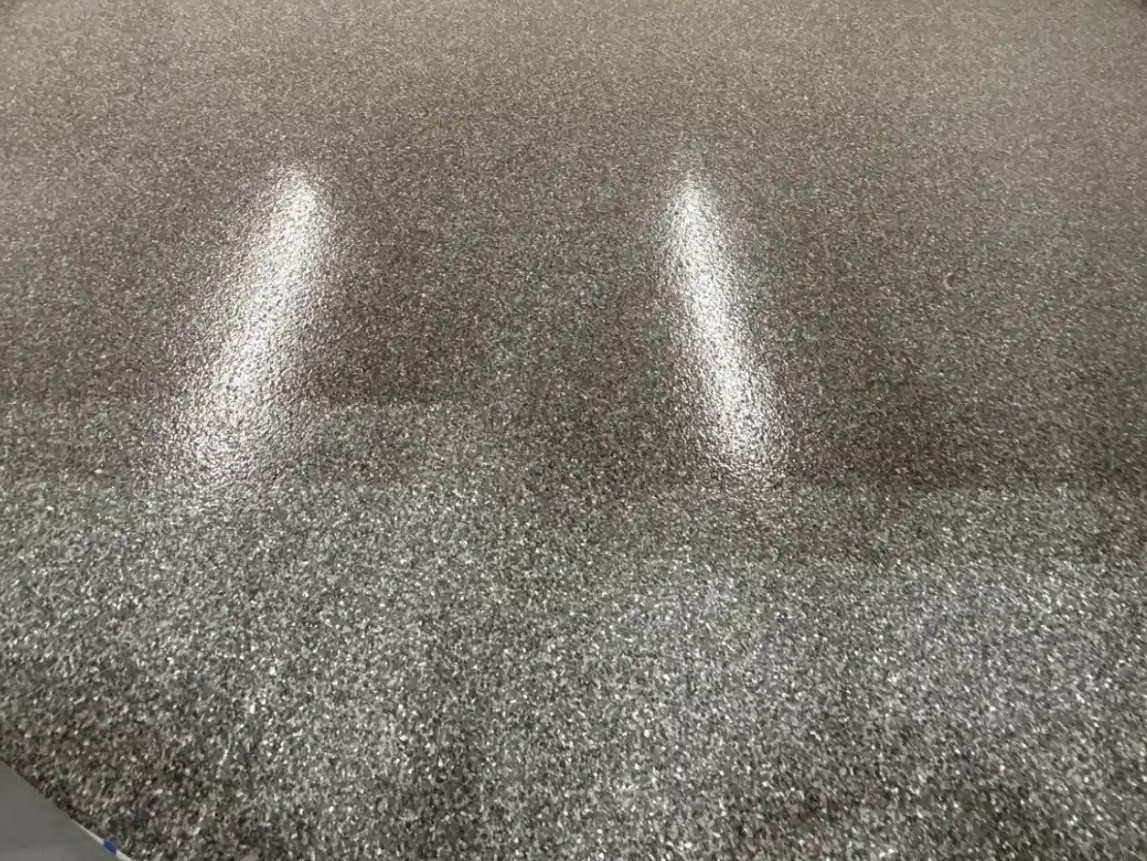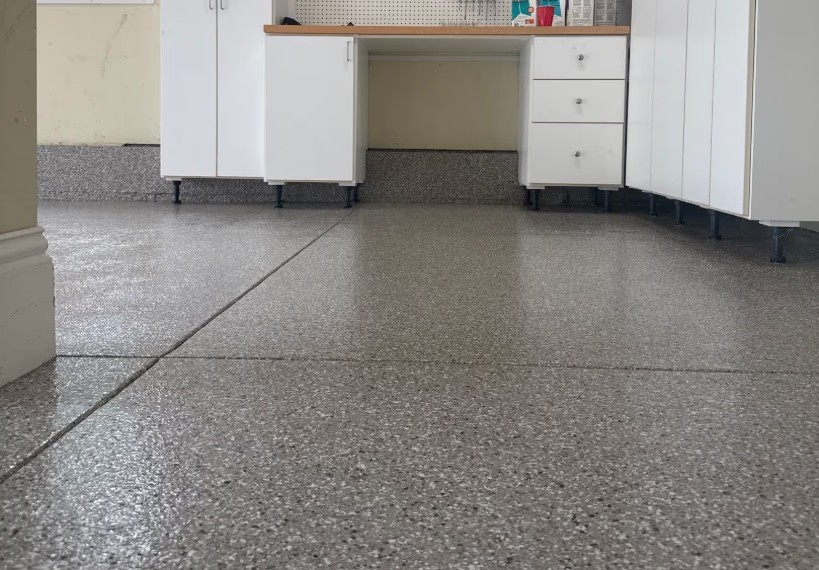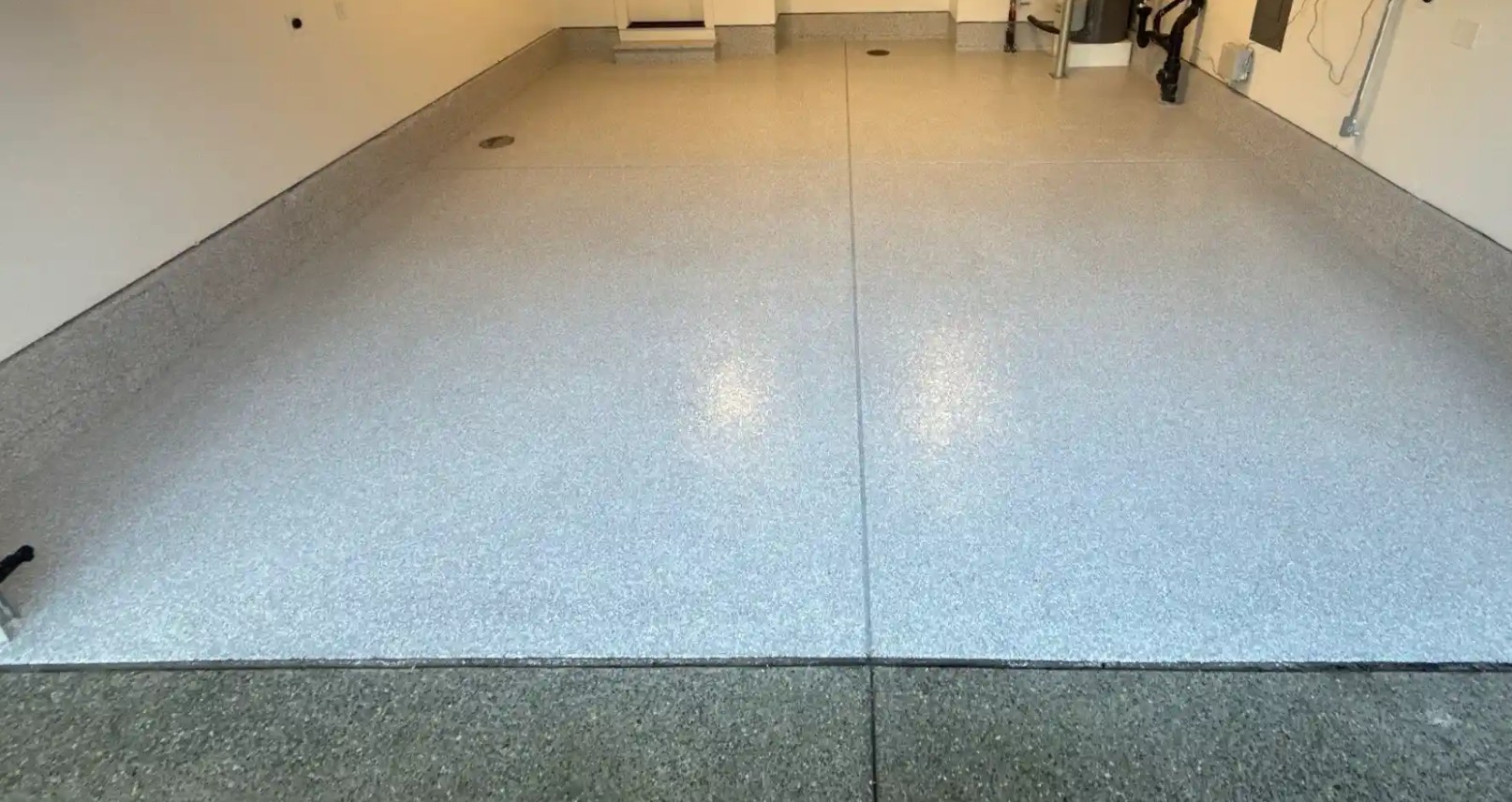When it comes to transforming your garage floor or concrete surfaces, the choice between polyurea and epoxy can make the difference between a stunning, long-lasting investment and costly disappointment. While both options might look similar on day one, the real differences become apparent over time. Let's dive deep into this comparison to help you make the most informed decision for your concrete coating project.
The Bottom Line: Why This Choice Matters
Choosing the wrong concrete coating isn't just about aesthetics—it's about avoiding the frustration of having to empty your garage again, the cost of premature replacements, and the regret of settling for a floor that fails when you need it most. With polyurea floors lasting 5x longer than typical epoxy (30-40 years vs. 3-15 years), understanding these differences could save you thousands in lifetime costs.
Understanding the Fundamentals
What Is Epoxy?
Epoxy is a thermosetting resin that has been the traditional choice for concrete coatings. It's widely available, relatively inexpensive, and creates an attractive finish when first applied. However, epoxy's popularity stems more from its accessibility and low initial cost than from its performance characteristics.
What Is Polyurea?
Polyurea, particularly certified Penntek polyurea, represents the next generation of concrete coatings. It's a more advanced chemical formulation that creates superior bonds with concrete and offers dramatically enhanced performance characteristics across virtually every measure that matters to homeowners.
The Critical Difference: Chemical vs. Mechanical Bonding
This is perhaps the most important distinction between these two coating types:
Epoxy creates a mechanical bond with concrete—essentially gripping onto the surface texture. This type of bond can be separated from the concrete over time, leading to peeling, blistering, and delamination.
Polyurea forms a chemical bond with concrete that's so strong, the concrete itself would break before the coating separates. When properly installed, certified Penntek polyurea creates a bond that's actually stronger than the concrete substrate.
Durability and Longevity: The Real Cost Comparison
Epoxy Durability Challenges
- Lifespan: Typically 3-5 years before showing significant wear
- Brittle nature: Cracks and chips easily under impact
- Temperature sensitivity: Can become brittle in cold weather
- Chemical vulnerability: Susceptible to damage from common garage chemicals
Polyurea's Superior Performance
- Lifespan: 30-40 years with proper installation
- Flexibility: Superior elongation properties allow movement without cracking
- Impact resistance: Can withstand heavy impacts without damage
- Temperature stability: Performs consistently across temperature ranges
The Lifetime Cost Reality: While epoxy may cost less initially, you'll likely need 2-3 complete reinstallations over the lifespan of one polyurea floor, making polyurea the more economical choice long-term.
[Link to our lifetime warranty information]
UV Stability and Appearance Retention
The Epoxy Yellowing Problem
One of epoxy's most disappointing characteristics is its susceptibility to UV damage. Even indoor applications can experience:
- Yellowing and discoloration over time
- Fading of decorative flakes and colors
- Overall degradation in appearance within 2-3 years
Penntek's FadeLock™ Technology
Certified Penntek polyurea includes FadeLock™ technology—a proprietary additive that:
- Blocks UV rays from penetrating the coating layers
- Preserves color integrity of polymer flakes
- Acts like sunscreen for your floor
- Maintains vibrant appearance for decades
Installation Time and Process
Epoxy Installation Challenges
- Multi-day process: Typically requires 3-5 days for complete installation
- Extended cure times: Multiple coats with waiting periods between applications
- Temperature sensitivity: Installation must be precisely timed for optimal conditions
- Moisture vulnerability: Easily compromised by moisture during installation
Polyurea's One-Day Advantage
- Single day installation: Complete transformation in one day
- Rapid cure times: Walk on in hours, full use the next day
- Weather tolerant: Less sensitive to installation conditions
- Professional efficiency: Minimizes disruption to your daily routine
Maintenance and Cleaning
Epoxy Maintenance Challenges
As epoxy ages, its porous nature becomes more pronounced, leading to:
- Increased staining and discoloration
- Difficulty removing oil, chemicals, and other garage spills
- Requirement for harsh cleaning chemicals
- Progressive degradation of the surface
Polyurea's Non-Porous Advantage
Certified Penntek polyurea maintains its non-porous surface throughout its lifespan:
- 100% antibacterial and antimicrobial properties
- Easy cleanup with simple soap and water
- Resistance to staining from oils, chemicals, and road salt
- Consistent cleaning ease over the entire floor life
Flexibility and Substrate Movement
Why Flexibility Matters
Your concrete slab is constantly moving—expanding and contracting with temperature changes, settling, and seasonal ground shifts. Your floor coating must be able to accommodate this movement without failing.
The Flexibility Test Results
Independent testing using extensiometer tension testing reveals dramatic differences:
- Epoxy: Breaks and delaminates under minimal stress
- Lower-grade polyurea: Fails under moderate stress
- Certified Penntek polyurea: Maintains integrity even under extreme tension
This flexibility difference translates directly to real-world performance as your garage floor experiences daily temperature fluctuations and seasonal changes.
The Quality Control Factor
The Epoxy Market Reality
Epoxy's popularity stems from its ease of use and availability. This accessibility means:
- Wide variation in product quality
- Inconsistent installation standards
- Limited training requirements for installers
- Often marketed primarily on price rather than performance
Certified Penntek Advantage
Penntek maintains strict quality control through:
- Certified dealer network: Only trained, certified professionals can install
- Proprietary formulations: Available exclusively through certified dealers
- Rigorous training programs: Installers complete comprehensive certification
- Ongoing quality monitoring: Consistent standards across all installations
Cost Analysis: Beyond the Initial Price
The Hidden Costs of Epoxy
While epoxy appears less expensive initially, consider these factors:
- Frequent replacement needs (every 3-5 years)
- Ongoing maintenance and repair costs
- Loss of garage use during multiple reinstallations
- Decreased home value from poor-performing floors
- Potential damage to stored items from coating failures
Polyurea's True Value Proposition
- Single installation lasting 30-40 years
- Minimal maintenance requirements
- Lifetime manufacturer warranty protection
- Increased home value from premium flooring
- Peace of mind from long-term durability
Cost Per Year Analysis:
- Epoxy: $800-1,200 per installation × 6-8 reinstallations = $4,800-9,600 over 30 years
- Polyurea: One installation lasting the entire period with lifetime warranty protection
Environmental and Health Considerations
Epoxy Concerns
- Strong chemical odors during installation and curing
- Potential VOC emissions
- Requires harsh chemicals for maintenance
- More frequent replacements create waste
Polyurea Benefits
- Low odor installation process
- Environmentally responsible formulation
- Easy maintenance with eco-friendly cleaning
- Longer lifespan reduces environmental impact
Making the Right Choice for Your Project
Choose Epoxy If:
Honestly, given the performance differences and lifetime cost analysis, it's difficult to recommend epoxy for any serious flooring application. The only scenario where epoxy might make sense is for temporary installations where longevity isn't a concern.
Choose Certified Penntek Polyurea If:
- You want the lowest lifetime cost of ownership
- You value long-term durability and performance
- You prefer a one-day installation process
- You want a floor that maintains its beauty for decades
- You desire lifetime warranty protection
- You want to avoid the hassle of future reinstallations
The Installation Quality Factor
The best coating in the world won't perform properly without expert installation. This is where the certified dealer network becomes crucial.
Critical Installation Elements:
- Proper concrete analysis: Hardness, moisture, and composition testing
- Meticulous crack repair: Every crack is a potential failure point
- Pristine substrate preparation: Professional grinding and cleaning
- Environmental controls: Temperature and humidity management
- Expert application: Proper thickness and coverage
- Quality assurance: Multi-step inspection process
Real-World Performance Comparisons
Impact Resistance
Independent testing shows dramatic differences when floors are subjected to impact:
- Standard epoxy: Chips and cracks easily
- Certified Penntek polyurea: Withstands sledgehammer impacts with only surface abrasions
Chemical Resistance
Common garage chemicals affect these coatings differently:
- Epoxy: Staining and degradation from oils, road salt, and cleaning chemicals
- Polyurea: Superior resistance maintains appearance and integrity
UV Exposure
Accelerated weather testing reveals:
- Standard coatings: Significant yellowing and color degradation
- Penntek with FadeLock™: No measurable color change
Avoid the "Epoxy Trap"
Many homeowners fall into what we call the "epoxy trap"—choosing based on initial cost only to face expensive consequences later:
- Year 1-2: Floor looks good, homeowner satisfied
- Year 3-4: Yellowing, chipping, and staining become noticeable
- Year 5: Major failure requiring complete replacement
- Total cost: Often 2-3x the original polyurea investment
Don't let a low initial quote lead to ugly coatings and premature replacements.
The Warranty Difference
Typical Epoxy Warranties
- Limited coverage (1-5 years maximum)
- Exclusions for normal wear and tear
- Often voided by installation issues
- No manufacturer backing
Certified Penntek Warranty
- Lifetime manufacturer warranty
- Comprehensive coverage
- Direct manufacturer backing
- Professional installation guarantee
Frequently Asked Questions
Q: Can I install polyurea myself? A: Certified Penntek polyurea is only available through certified dealers to ensure proper installation and warranty coverage.
Q: How long does installation really take? A: Most polyurea installations are completed in a single day, with the floor ready for light use within hours.
Q: What about moisture issues? A: Properly installed polyurea handles moisture much better than epoxy, but substrate analysis is still crucial.
Q: Is the color selection limited? A: Certified Penntek offers extensive color and finish options, often exceeding epoxy choices.
Making Your Decision
The choice between polyurea and epoxy isn't just about floor coatings—it's about choosing between:
- Short-term savings vs. long-term value
- Temporary satisfaction vs. lasting pride
- Multiple disruptions vs. one-time installation
- Uncertainty vs. warranty protection
When you consider the total ownership experience, certified Penntek polyurea represents not just the better choice, but the smarter investment in your home and peace of mind.
Next Steps
Ready to experience the difference of a truly superior concrete coating? Our certified technicians provide:
- Free in-home consultations
- Detailed analysis of your concrete
- Customized recommendations for your specific needs
- Transparent pricing with no hidden fees
- Professional installation backed by lifetime warranty
Don't settle for yesterday's technology when you can have the concrete coating everyone wishes they had. Contact us to get started.
